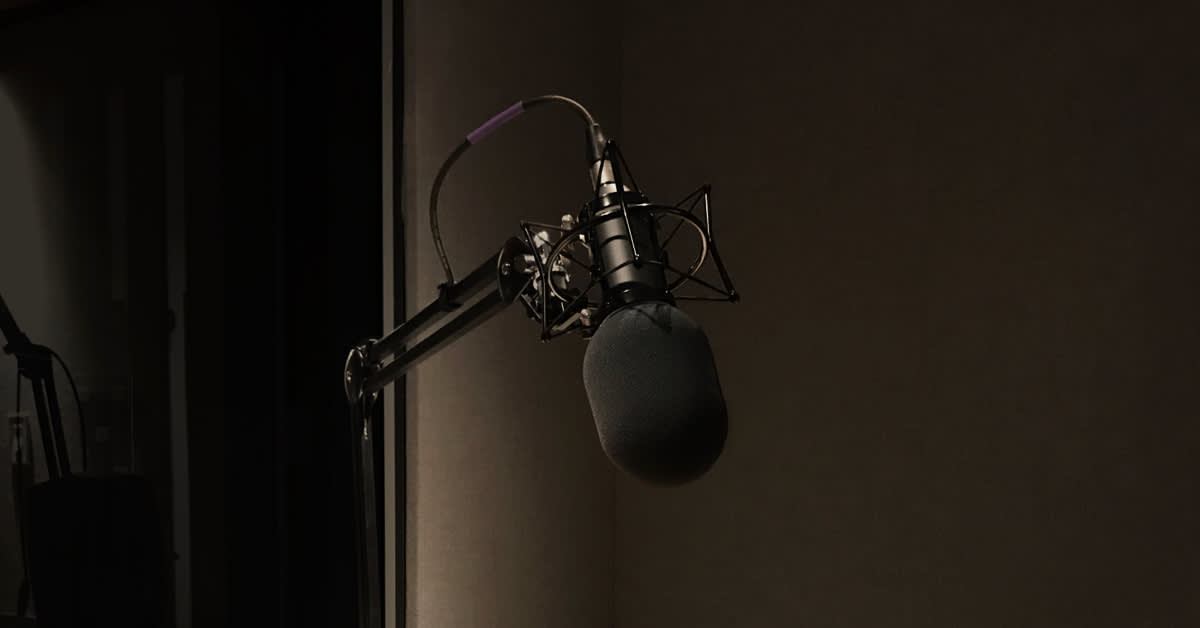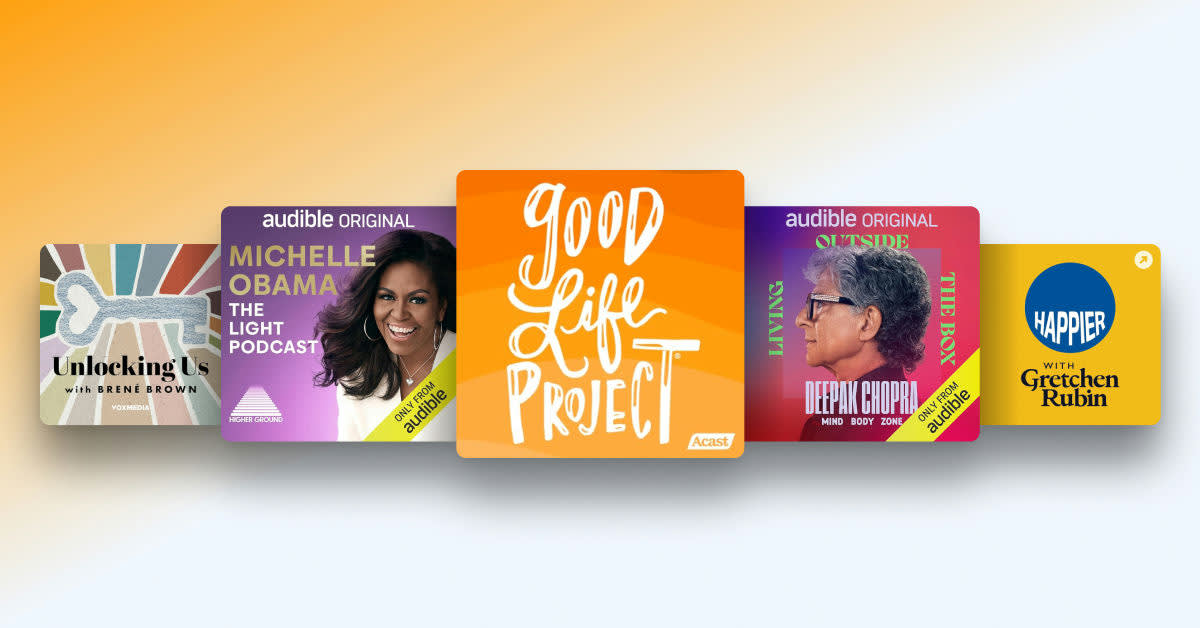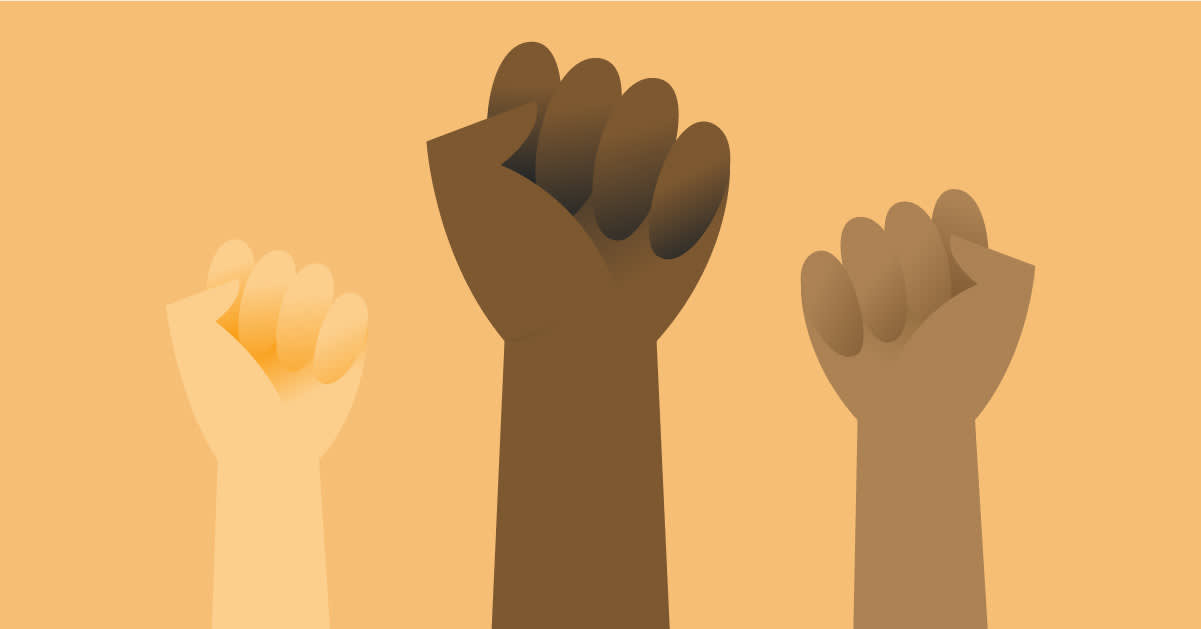It’s not breaking news that podcasts are hot. Both listening and production have skyrocketed over the past decade, with an estimated 104 million monthly podcast fans regularly tuning into their favorite shows in the United States alone (source: Edison Research). Why the big boom? When compared to mediums like television and music production, podcasting is a more democratized media format. Consider this: podcasting has a relatively low barrier to entry, requires little equipment, has low startup costs, and can be a fun way to get your voice, stories, and ideas out into the world.
Right about now you might be thinking, "Hey, that sounds pretty good—I bet I could start a podcast," and you’re probably right. Most folks interested in podcasting find themselves in a similar situation: they have an idea or format in mind but aren't sure how to really kick their dreams into motion. Since having a clear, step-by-step plan can help you make your ideas a reality, consider this guide your personal podcasting roadmap!
1. Do Your Research
Odds are, you already listen to several podcasts. (If you don’t, check some out before getting started on your own!) But as you conduct some competitive research and unlock your own inspiration, listen strategically. Ask yourself: What’s the premise here, what's the big idea? Pay attention to how your favorite shows present and package the content; do they have multiple hosts, recurring segments, guests? If you really want to get strategic, you can listen to a podcast about podcasting itself, like Nick Quah’s Servant of Pod, which has an archive of 44 episodes to explore, or check out some of our favorite audiobooks about the process of podcasting to get your creative gears turning…
Everybody Has a Podcast (Except You)
By Justin McElroy, Travis McElroy, Griffin McElroy
Narrated by Griffin McElroy, Travis McElroy, Justin McElroy, Sydnee McElroy, Rachel McElroy, Teresa McElroy, Clint McElroy
Everybody Has a Podcast (Except You)
Penned by Justin, Travis, and Griffin McElroy, who created the hit podcasts My Brother, My Brother and Me and The Adventure Zone, this hilarious how-to-guide for starting your own podcast is definitely worth a listen for any aspiring podcaster. The comedic brothers walk listeners through the process of turning a cool podcast idea into reality, from deciding on a name to equipment technicalities like which type of microphone to use. Their tips for success and cautionary anecdotes are not only useful but super fun to listen to.
So You Want to Start a Podcast
This Audie Award-winning audiobook, written and narrated by award-winning podcaster Kristen Meinzer, focuses on everything from hosting to booking guests to editing and eventually marketing your own podcast. Meinzer’s insider stories and personal asides make learning the ropes of podcasting fun.
Make Noise
Podcasting veteran Eric Nuzum brings a career's worth of relevant experience to the table in Make Noise. Nuzum spent more than a decade creating industry-leading podcasts at organizations including Audible and NPR; in 2019 he co-founded Magnificent Noise, a podcast production and creative consulting company based in New York City. This guide to creation is full of both hard-won wisdom and practical advice for anyone looking to “make noise” in the podcasting space.
2. Choose Your Topic
There are a few different ways to approach coming up with a topic to focus your podcast around. A good place to start is to think about things you are already hooked on or know a lot about. Do you love to knit or read? What about your knowledge of baseball, Italian cooking, or wood carving? Thinking deeply about a subject or hobby you’re genuinely passionate about can be a wonderful place to generate authentic ideas.
That said, don’t worry too much about being absolutely unique. With the number of podcasts out there, it’s very likely that the subject you want to talk about is already being covered by another show. What matters most is finding a subject you care about. You'll be able to find your own special niche by leaning into your own personality and presentation.
Kyle Souza, Senior Manager of Editorial and Production Operations at Audible, played a key role in the creation of Audicted, a podcast from the Audible editors that helps guide listeners to their next great audio discovery. Souza says that when it comes to brainstorming a topic and title for your pod, it's best to pay attention to what comes organically. To come up with ideas for their new podcast, the editorial team drew inspiration from content they personally loved and found themselves engaging with.
“We also thought about our goals for the podcast," Souza says. "For us, the goal was to provide an avenue of discovery for listeners.”
3. Consider the Ideal Format for Your Podcast
There are many different types of popular podcast formats. Deciding which one lends
itself best to the content you plan to create is important to ponder before recording. You can always change this up depending on the direction your podcast ends up taking, but having a basic format in mind can be a good north star to follow. Here are three of the most common podcast formats:
Interviews
Interview shows will generally have the same consistent host or hosts, with a new guest to be interviewed for each episode. A good way to keep interview-based podcasts interesting is to have a common thread that connects all the guests. Maybe each person interviewed is an accomplished athlete or an avid bird watcher—the connection itself can be just about anything. If the guests share a passion and can talk about it with an engaging host, an audience will come in time.
Narrative
Great for audiobook fans, this format can work for either fiction or nonfiction. Stories are told in an episodes, which keeps listeners coming back week after week.
Conversational
Conversational podcasts generally consist of free-flowing conversation between at least two hosts. Often conversational podcasts are more comedic in nature, and revolve around
topics like pop culture or current events that have broad audience potential.
Eliot Wilson, Media Operations and Production Manager at Audible, emphasizes how important it is to have a compelling through-line when developing a podcast. For example, many successful podcasts are built around a topic that lends itself to exploring a multitude of threads and subtopics that live under the large umbrella subject. “That's why serial killer podcasts are so popular!” says Wilson. “They give people a reason to return. They want to listen to the whole season rather than just tuning in for one specific episode.”
4. Name Your Podcast
Having a name for your podcasting project can help make it feel more real. It will also quickly become a shorthand pitch that helps people connect with the concept. Naming is a necessary step from the idea-in-your head phase to an actual, presentable piece of media with its own unique identity.
When coming up with a name for your podcast, look to the success stories. Think of the most popular podcasts out there—what makes their names eye-catching to potential listeners scrolling through an endless list of options? Some reel in their audience with evocative or unusual phrases, like Wait Wait... Don't Tell Me! and No Such Thing as a Fish. Others describe their premise in a funny way, like SmartLess, a comedy podcast in which hosts Jason Bateman, Sean Hayes, and Will Arnett learn from each other through hilarious interviews and anecdotes with a variety of guests.
When it comes to choosing a title for your podcast, Wilson urges new creators against jumping too quickly on the bandwagon of a trend. “Don’t just choose the most popular
thing; find something you are already an expert on, or something you want to be
an expert on, and go from there,” he says. Whatever you end up deciding to focus on, your podcast's name should somehow evoke that central idea. The style of the title will be informed by the tone you choose to take. Think about how you want your podcast to be perceived. A serious, narrative-driven show will have a very different title than an unscripted comedy podcast.
5. Record Your Podcast (!)
Figuring out how to actually record a podcast keeps most of us out there from turning our
podcasting dreams into reality. The good news is you don’t need a lot of equipment, and there are plenty of places to find affordable podcasting microphones. If you're already a bit audio-savvy, you may also consider looking into an audio interface or mixer so you can have more advanced control over your audio levels. However, if you don't have any audio experience, don't worry! A simple plug-and-play mic is great, and you can even go sans mic and record using just your laptop if you so choose. There are multiple programs that allow for this type of recording, using the website itself and your laptop's audio to record without a mic.
Don't fret too much over which equipment to buy when you’re just getting started. Your content is what will bring listeners back week after week. Your audio just needs to be
clear and consistent. Focus on fine-tuning your content, not the fancy equipment you don’t need. As long as the show isn't gratingly loud or whisper-quiet, most listeners will care first and foremost about the stories you tell.
It sounds like an oversimplification, but the most (and perhaps only) important part of this step is to get in a chair (or your closet—more on that later) and actually press record. Try your best not to overthink or edit yourself too much, especially when recording your first few episodes. If you’re genuinely enjoying the process and flowing in your own creative rhythm, the audience will be able to tell and are much more likely to enjoy listening.
Souza says the editorial team makes sure to fact-check important points, such as the pronunciation of names and the full titles of books, prior to recording. But once they step into the recording booth or start a video chat, the group lets loose with free-flowing
conversation, always keeping in mind that bloopers, false starts, and side-tangents
can be edited out in the end.
Here are some pro-recording tips for beginners from our editorial and social teams:
If you don’t have a professional mic or you have lots of outside noise, try recording in a closet. Recording in a small space, insulated by clothes, is a favorite trick of audio engineers for getting great sound.
Don’t worry about editing when you’re in the studio. This is where some of the magic is bound to happen. Let loose, and remember you can always edit later.
Start with a good “cold open”—listen to the full episode and pick out a compelling or funny clip that will catch the audience's attention and put that up top, as an informal intro to the episode.
6. Find the Right Recording Equipment
Like we said, there is no need to stress over hunting down the most ideal equipment. Here are a few basic recommendations to keep in mind, though, if you do choose to create
your own makeshift recording studio:
Condenser microphone
This type of microphone captures audio more clearly and with greater detail than most mics.
Adjustable boom stand
This handy tool can help filter out background noise and also allows for speaking into your microphone in a more natural and relaxed position. That way, you can record easily and without straining, rather than hunching over the mic.
Pop filter
A pop filter, sometimes known as a pop shield, is used for noise protection in most recording studios. This tool eliminates the popping sound caused by talking or singing into a microphone that you might notice in certain audio productions (and that you probably want to avoid).
7. Edit Your Podcast
Phew. You’re finally done recording. But once you've recorded your first episode, you’re a
long way from being able to send your creation out into the world. There are a few different ways to edit your podcast before you officially deem it “done.” You can choose to pay for professional podcasting services to handle all your postproduction needs, or if you're looking to podcast on a budget (like most of us are), Audacity is a great free option to check out. It's an open-source digital audio editing program, used by professional podcasters and newcomers alike.
Whatever you pick, keep in mind that editing is where a podcast really comes to life. When you record, the raw audio may not sound very much like a show, especially if you intend for your podcast to have a narrative arc with music cues and other sound design. Editing will take a significant commitment of time, but it is arguably the most essential part of making a great podcast.
Here are some pro-editing tips for beginners from our editorial and social teams:
Make transitions as smooth as possible. When changing from one topic to another or introducing a new guest or segment, awkwardness sometimes happens, but can easily be smoothed over by cuts or even soft musical transitions.
Edit out potential time-wasters (like long, rambling tangents).
Don’t be so quick to edit out audio that is a little off topic–asides that are authentic, interesting, and unscripted can be some of the best content for making listeners feel closer to the hosts (who are only human too)!
8. Publish and Host Your Podcast
Now that you've got a fully edited episode of your show ready for the listening world, you'll need to find a way to host it online. There are many podcast hosting services that will distribute your show to the major platforms.
Similar to editing your podcast, there are plenty of hosting services that will cost you. Since all you need is a platform to push your new creative content out into the world, we recommend checking out more bare-bones, free platforms that will get the job done. Often, creators are able to host and publish podcasts using free websites. Keep in mind that free sites do come with caveats, mostly when it comes to marketing. Pricier paid services often have more flexibility when it comes to marketing options. Bottom line: do your own hosting research to make sure the fine print doesn't rub your creative spirit the wrong way.
The way information is presented is important, Wilson stresses, and shouldn’t be overlooked when a podcast is heading towards distribution. “When we talk to podcast creatives, which we do all the time,” he says, “we always tell them to identify and lead with their strongest episode, their strongest story.”
9. Advertise and Market Your Podcast
We wish we could boil this down to a science, but since we can’t, we’ve outlined some tips for getting your show to play in as many ears as possible:
Leverage Social Media
Creating social media channels for your show gives potential listeners a centralized place to look for new episodes, updates, and other info pertaining to your podcast. Odds are you already have social media of your own, so don't be shy about plugging your new podcasting endeavor to your Twitter followers, Facebook friends, and Instagram buddies.
Invite Participation
Many popular podcasts make interacting with their listeners a priority. For example, the
comedy advice podcast My Brother, My Brother and Me sources many of their comedy prompts from their audience in the form of advice-seeking emails or other submissions. Having an email address to which listeners can send their thoughts and comments can help create a sense of interaction on each episode, as well as keep people listening week after week to hear if you acknowledge their messages on air.
Be Consistent
There is perhaps no more important quality to strive for in podcasting than consistency. When brainstorming how to do a podcast, one of the first things you should ask yourself is how often you will be able to commit to doing it. Whether weekly, biweekly, or monthly, the best podcasts usually have a consistent day of the week or month when they post new content, which in turn makes the publishing of their episodes a part of their listeners' routines. And we all want people out there who look forward to listening, right?
Wilson suggests finding out where your target audience hangs out virtually and marketing there. “You can find specific communities online for just about anything,” he notes. “Offer them something that is beneficial to them rather than just selling them on your podcast. Ask yourself: What can they learn if they listen?”
10. Take It to the Next Level
Now that you’re revved up and ready to record, we would like to introduce you to...
*drum roll please*... the Audible Podcast Development Program!
This program grants a $10,000 commissioning fee to selected creators. For successful applicants, Audible will also cover production costs, lend the use of state-of-the-art equipment, offer editorial feedback, provide invaluable networking resources, and potentially host your podcast on our service, sharing it with millions of subscribers.
Audible Senior Director of Publisher Relationships Kelley Sullivan, who serves as director of the program, says the ultimate goal is to uplift underrepresented voices. “We are looking for diversity of ideas, geographic region, background, race, everything,” she says. “This program allows us to support up-and-coming talent in an exciting and tangible way.”
When it comes to the submissions received so far, Sullivan couldn’t be more impressed with the creativity and level of openness she has seen from emerging creators.
“I’ve been so blown away by the willingness to share stories, some of them deeply personal,” says Sullivan. “So many creators want to hear stories they can relate to and that resonate with them. They want to hear more of themselves.” The program is currently focusing on creating episodic-format, narrative podcasts across a broad array of genres.
Despite the growing proliferation of podcasts and competition on the landscape, keep in mind: creating a good, quality show that listeners return to week after week isn’t easy, and there's still plenty of room for new voices like yours to be heard. If there's one thing we hope you take away from this guide, it’s that anyone with an idea and some dedication can start a podcast. We hope this article empowers you to get started. Happy podcasting!







